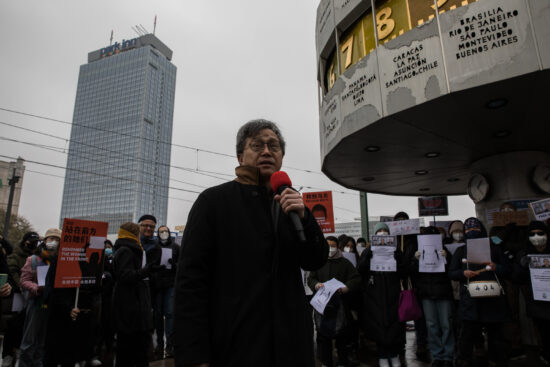On December 3, 2022, protesters gathered in Berlin to express their solidarity with the people of China. The demonstration, which was registered with the authorities, began at Alexanderplatz and ended at the Chinese Embassy. The protesters held blank sheets of white paper as a symbol of resistance to China’s censorship and as a call for the resignation of China’s leader, Xi Jinping. “We want freedom, we want democracy,” the protesters chanted.
Jhy-Wey Shieh, 謝志偉, a Taiwanese German scholar and Taiwan’s current diplomatic representative to the Federal Republic of Germany, gave a speech at the protest. On the Jannowitz Bridge, opposite the Chinese Embassy, the protesters held a vigil, lighting candles and laying flowers.
The demonstration in Berlin is part of a global movement calling for the end of Chinese oppression and for the protection of human rights in China. Many protesters feel a strong connection to the people of China, and are committed to standing in solidarity with them.
The topic of censorship in China is a contentious one, with the government imposing strict controls on the flow of information within the country. This censorship is not only limited to the media, but also extends to the internet, with the government implementing a number of measures to monitor and block access to certain websites and social media platforms.
One of the most well-known examples of censorship in China is the so-called “Great Firewall,” a system of filters and blocks that the government uses to control the flow of information across the internet. This system has been criticized by human rights groups, who argue that it is used to stifle dissent and prevent the free flow of information.
In addition to censoring the internet, the government also controls the media, with state-run outlets being the only source of news for many Chinese citizens. This means that any news that is deemed to be critical of the government or its policies is often not reported.
Furthermore, the government has been known to censor and even punish individuals who speak out against the regime. In recent years, a number of activists and dissidents have been arrested and imprisoned for expressing their views online.
Overall, the issue of censorship in China is a complex and ongoing one, with the government continuing to implement measures to control the flow of information within the country. While this censorship may be justified by the government as a means of maintaining social stability, it has been widely criticized by human rights groups and other organizations as a violation of freedom of expression.
Picture: MICHAEL KUENNE / PRESSCOV





